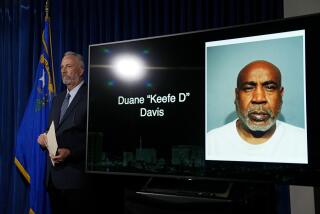He Insisted on Doing Things His Way
- Share via
A quick glance at the overflow crowd filling Catalina Bar & Grill Monday night for a tribute to pianist-composer Horace Tapscott triggered an inevitable thought: How full would the room have been for a program by Tapscott himself on a Monday night?
And the equally inevitable answer was: not very full at all. If ever there was a prophet without honor beyond his own community, it was Tapscott. When he died of cancer in February at age 64, his small catalog of recordings (with the exception of a few late outings for Arabesque) were all done for the small Nimbus label, and he was relatively unknown to the wider jazz audience. This, despite the fact that Tapscott’s music was filled with riches, a rare combination of accessibility and adventurousness.
But Tapscott spent much of his life asserting that fame and fortune were less significant to him than the opportunity to do his music his own way, and the need to be a productive member of his community. To his credit, he was eminently successful in both endeavors. And the most attractive aspect of the tribute program was the manner in which it touched upon all of those aspects of Tapscott’s life and work.
The edgy, avant-garde elements in his music were the subject of the opening ensemble’s music. A group consisting of saxophonist Arthur Blythe, woodwind player Vinny Golia, bassist Art Davis, guitarist Nels Cline and drummer Alex Cline showcased two Tapscott works: “Niger’s Theme” and “The Dark Tree.” Blythe, a frequent Tapscott sideman, brought the right blend of inside blues and outside improvising to a performance that otherwise occasionally erred on the side of percussive overstatement. A similar group led by cornetist Bobby Bradford, including Cline, Golia and another longtime Tapscott associate, bassist Roberto Miranda, played a similar set, its music illuminated by Miranda’s remarkably smooth-toned lines and Bradford’s quirkily imaginative improvising.
Bandleader Gerald Wilson took a few moments to offer some reminiscences of the time when Tapscott was a trombonist in Wilson’s orchestra. He was followed, appropriately, by the Gerald Wiggins trio, playing a set of standards recalling the swinging, mainstream jazz that always simmered inside even the most envelope-stretching of Tapscott’s work. The trio’s crisply articulated performance, with Andy Simpkins’ adventurous bass playing and Paul Humphrey’s precise drumming, offered a dramatic musical polarity to the high voltage of the Golia-Blythe ensemble. But when they were joined by tenor saxophonist Herman Riley, the music took an abrupt turn, with Riley--like Blythe--adding a Tapscott-like combination of hard bop blues and wild, boundary-less abstractions.
An ensemble of Tapscott’s last working band concluded the evening with more of the honoree’s work. The four-horn front line--George Harper, tenor sax; Jerry Rusch, trumpet; Michael Sessions, alto sax; Phil Ranelin, trombone--and rhythm section--Henry Franklin, bass; William Henderson, piano; Donald Deane, drums--played with a brisk rhythmic drive, adding yet another Tapscott perspective to the evening. Combined with the balance of the music, it was an illuminating view of a talented artist determined to follow his own path.
And it remained for poet Kamau Daa’ood, a Tapscott friend and disciple, to provide the most effective understanding of that path with a passionate dedicatory poem titled “Poppa.” Read to the accompaniment of Miranda’s bass, it concluded with the lines: “I am Horace Tapscott. And I am not for sale.”
Death of Joe Williams: *Jazz singer Joe Williams has died at the age of 80. See obituary in main news section.
More to Read
The biggest entertainment stories
Get our big stories about Hollywood, film, television, music, arts, culture and more right in your inbox as soon as they publish.
You may occasionally receive promotional content from the Los Angeles Times.










